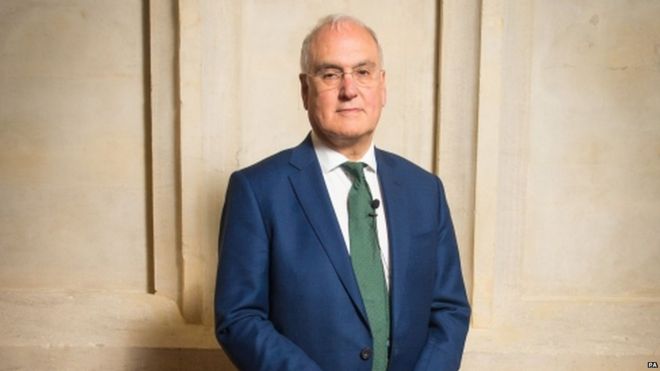
The idea that poor children will benefit from a return of grammar schools is “tosh” and “nonsense”, says the outgoing chief inspector of Ofsted.
Sir Michael Wilshaw said a return to selection at 11 years old would be a “profoundly retrograde step” that would lead to sliding standards.
He spoke out after reports that Prime Minister Theresa May favours changing the law so new grammars can open.
England’s Education Secretary Justine Greening is looking into the issue.
Supporters of grammar schools say that children from poor backgrounds are helped to make the most of their potential because entry to such schools is on the basis of raw ability.
But many argue that, in fact, the vast majority of those doing well in entrance tests are children whose parents have paid for them to be privately tutored outside school.
In a speech to London Councils’ education conference, Sir Michael praised the success of schools in the capital saying they had undergone an “amazing transformation” and lead the way in “narrowing the attainment gap between rich and poor”.
“It has maintained its status as the top performing region across all key stages when it comes to the performance of children eligible for free school meals,” he said.
The soaring success of London schools made “a mockery of the claim that opening up many grammar schools is the key to unlocking the potential of disadvantaged children and to boosting social mobility,” he said.
‘Pretty woeful’
“If grammar schools are the great answer, why aren’t there more in London?
“If they are such a good thing for poor children, then why are poor children here in the capital doing so much better than their counterparts in those parts of the country that operate selection?”
He said he appreciated that many grammar schools did a “fine job”, but added that their record of admitting children from non-middle class backgrounds was “pretty woeful”.
“The notion that the poor stand to benefit from the return of grammar schools strikes me as quite palpable tosh and nonsense – and is very clearly refuted by the London experience.”
He cited figures showing the under-representation of poor pupils in grammar schools.
In Bexley, he said grammar schools had 9% of pupils on free school meals, compared to 28% in non-selective schools.
In Sutton, where five out of 14 schools are grammars, the proportion is about 7% in grammar schools and 25% in non-selective schools.
In a BBC interview this weekend, Mrs May did not answer directly a question about whether she planned to bring back grammar schools.
But she said Ms Greening was looking at the issue of new grammar schools as well as other areas of education policy.
Labour banned new grammars in 1998 amid concerns they were dominated by middle-class pupils whose parents gave them a head-start with private tutoring.
England’s first “new” grammar for 50 years in Sevenoaks, Kent, was only approved last year as an “annexe” to an existing school using a loophole in the law.
Shadow Education Secretary Angela Rayner described Sir Michael’s comments as “an embarrassing rebuke” for the Conservatives.
“The Tories should be concentrating instead on raising standards in all schools and improving education for all our children, regardless of their backgrounds.
“They are failing to do so. But they want to return to a system in which children were branded as failures at the age of 11 and which only increased division in our society.
[Source:- BBC]









